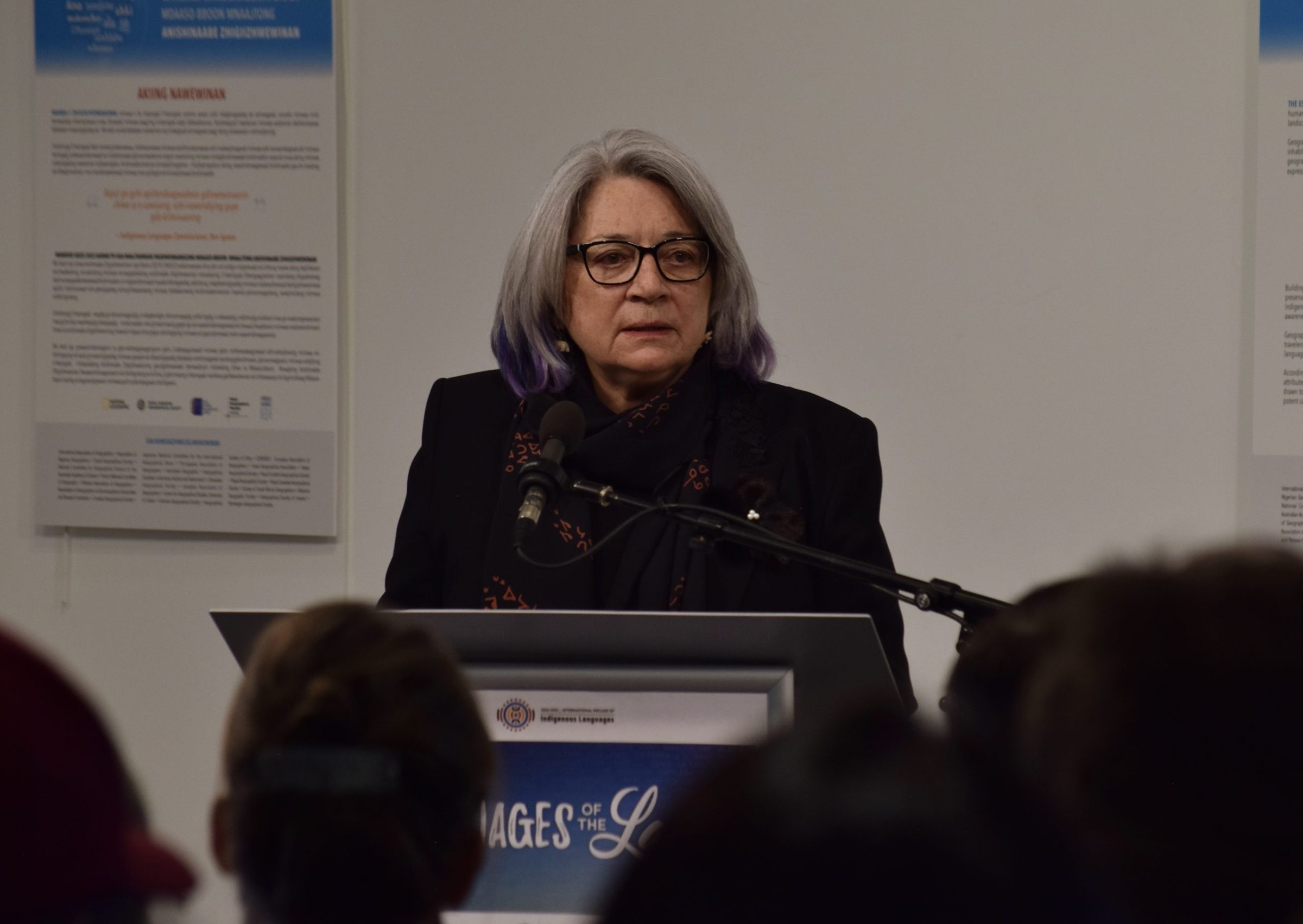‘We have to protect Indigenous languages’: Mary Simon
Governor General speaks at launch of Decade of Indigenous Languages in Ottawa Friday
Gov. Gen. Mary Simon speaks at the Canadian launch of the UN’s International Decade of Indigenous Languages at the Royal Canadian Geographic Society on Friday in Ottawa. (Photo by Madalyn Howitt)
Continuing to speak Indigenous languages is key to ensuring Indigenous cultures thrive, says Gov. Gen. Mary Simon.
“It is very much an integral part of our identity and we need to use every tool that we have to protect Indigenous languages,” Simon said in a speech Friday, marking the Canadian launch of the United Nations’ International Decade of Indigenous Languages.
She co-hosted the event at the Royal Canadian Geographic Society in Ottawa with its honorary president, Perry Bellegarde, former national chief of the Assembly of First Nations. Simon was made a patron of the organization earlier this month.
The Decade of Indigenous Languages, running until 2032, is meant to emphasize Indigenous peoples’ rights to freedom of expression and to an education in their mother tongue to help the survival of Indigenous languages around the world.
“As Indigenous peoples, one of the most important rights we have is the right to self-determination,” Bellegarde said.
“That’s because we have our own languages, our lands, our laws, our own people, and our own forms of government. So language is so important for our survival.”
Simon, the first Indigenous person to serve as Canada’s Governor General, said she believes Indigenous peoples have a “responsibility” to speak their traditional languages with family and friends as much as they can.
“There is no better way of preserving and enhancing one’s language (than) by using it in every possible way,” she said, noting she spoke Inuktitut in her throne speech last fall and when she was sworn in as Governor General last July.
“I think for me to use it and to speak it is important. I think it will be a kind of hope that we can keep our languages healthy and alive.”
Simon recalled growing up and being allowed to speak only English at her federal day school. She said she was punished if she was caught speaking Inuktitut in the classroom.
“Many Indigenous languages have been lost because of residential schools, colonization and the assimilation policies of churches and the government,” she said. “This was not a choice Indigenous people made, but it was done by force.”
It was only when she was at home that she could express herself in her first language of Inuktitut, Simon said.
“I thank my family every day for giving me the opportunity to really learn the language and have an in-depth understanding of what language means to each and every one of us,” she said.
She acknowledged the “great strength and resiliency” Indigenous peoples have shown in keeping their languages, cultures and identities alive despite years of adversity and assimilation policies.
“Reconciliation is allowing children to learn any other time in a safe space where they can succeed while speaking in their language of choice,” she said.
“To all the young people, I encourage you to continue your efforts to learn the languages and I know the preservation of our cultures will succeed with you leading the charge.”
The day-long event included a lighting of the qulliq, a traditional oil lamp, by Inuit elder Aigah Attagutsiak; a drumming prayer by Odeshkun Thusky, from Kitigan Zibi Anishinabe Nation; and a smudging by Joshua Morin (Métis) to open the ceremony.
Attendees were also treated to musical performances by Inuk-Mohawk singer Beatrice Deer, of Nunavik, Mi’kmaq singer Emma Stevens and Métis fiddler Zachary Willier before joining afternoon roundtables and discussions.
The event was livestreamed on Facebook and was a collaboration with the Canadian Commission for UN Educational, Scientific and Cultural Organization and the Canada Council for the Arts.







So-called leaders like Mary Simon are responsible for the collapse of Indigenous languages. Failure to deliver effective education and skills training for managerial jobs means that English is the language of business and commerce. Period. By contrast, managers in, say, Jamaica all speak the creole language of the people and it thrives. Same thing for many healthy minority languages pretty much everywhere. As you can see in any Canadian Chinatown.
Year after year Mary Simon gave the same speech saying education was an urgent priority for Inuit, not next month or next year, but starting right away. But she never delivered any hint of an implementation plan.
Implementation and programming is done at the territorial, regional and community level. Duh! Leadership starts from the territorial government.
The system in place in Canada is just for English and French, in almost everything we do we are expected to do it in these two languages and most of all in English, limiting ourselves with just one language.
There’s some great examples in Europe where you have one main standard language but also learn one or two more languages, it’s a common practice to learn additional languages.
What our territorial government needs to do is learn from these other countries and adopt a system that works.
https://www.cbc.ca/news/canada/north/greenland-nunavut-language-revitalization-in-schools-1.6425338
Our close neighbours have gone through changes in a short time and they have found a way to keep their language and incorporate in their schools, government and in the public sector.
We could learn a thing or two.
If there is anything that North America is terrible at it’s adopting functional systems from other jurisdictions. We have to do it wrong first, because reasons.
So so sad our Inuinnaqtun language is disappearing fast in our community of Kugluktuk .0nly English is taught here. All of innuinaktun teachers in our schools deliver all education practices 0nly in one language! And that is English.ask any kid from the school and the response will be- “we only color on paper and doodle in class” no first hand learning the language, we had a great teacher enter our education system and only spoke with innuinaktun language and taught everything in our language and was making a difference in children’s lives with our ancestral language but soon left as it turned out that the teacher never received bilingual pay and was put on a substitute teacher pay instead of a full time teacher. all of the Inuit substitute teachers for that school do not receive the bilingual pay because the principal states they are not educated teachers who have their degrees to teach inuit kids our own language!! How crooked is the system anyways The education system needs to be fixed up for Inuinnaqtun teachers in their own territory and not for the southern city living people who teach our kids how to cross city street with lines. Continue on and our language will be gone all in a matter of a decade .
Heck no kid in town will ever speak it nowadays in the kitikmeot region.
So so sad our Inuinnaqtun language is disappearing fast in our community of Kugluktuk .0nly English is taught here. All of innuinaktun teachers in our schools deliver all education practices 0nly in one language! And that is English.ask any kid from the school and the response will be- “we only color on paper and doodle in class” during innuinaktun period . no first hand learning the language !! we had a great teacher enter our education system and only spoke with innuinaktun language and taught everything in our language and was making a difference in children’s lives with our ancestral language but soon left as it turned out that the teacher never received bilingual pay and was put on a substitute teacher pay instead of a full time teacher. all of the Inuit substitute teachers for that school do not receive the bilingual pay because the principal states they are not educated teachers who have their degrees to teach inuit kids our own language!! How crooked is the system anyways The education system needs to be fixed up for Inuinnaqtun teachers in their own territory and not for the southern city living people who teach our kids how to cross city street with lines. Continue on and our language will be gone all in a matter of a decade .
Heck no kid in town will ever speak it nowadays in the kitikmeot region.
Do you want teachers to simply teach Innuinaqtun or to teach their subjects in Innuinaqtun? Those aren’t the same thing.
The problem NTI, for example, in their lawsuit with the GN refuses to admit is that in order to have full K-12 instruction in Inuktut three things have to happen: find the teachers, have the textbooks translated and, most importantly and the one issue they are politically terrified of, pick one dialect and one orthography and that’s the one everyone is going to be taught in.
That’s one of the things people bringing up Greenland as an example either don’t know or don’t want to admit: when they made the conscious decision to make Greenlandic a working language and a language of instruction, they picked one of the dialects and decided that was the one everyone would be taught, that all the books would be printed in, and the one all official business would be conducted in.
Until GN and NTI and the advocates for Inuktut instruction start by admitting that no, not every community is going to get taught in their own dialect because that’s simply not feasible, the education system in Inuktut will always be a joke. And, said to say for people in Cambridge Bay and Kugluktut, it means Innuinaqtun would probably no longer receive any support.
It would be great if our GN and NTI could work closer together with Greenland to figure out how we can make Inuktut work in our schools, yes they picked one dialect as a standard to use in the schools and as a working language in their governments, by doing so they have a standard in place for their language and it did not erode their own dialects in the communities or at home, it actually encouraged the use of their language more and this is what we see today in Greenland, here we just switch to English even if the majority of the people in the room speak Inuktut.
Research has shown it only takes one generation to lose a language and it seems we are moving in that direction, most of the young generation only speak English today, most of us parents only speak English to our kids and our schools only teach in English.
This seems like one of the few opportunities for NTI to take the lead and do something useful with its resources for the future of Inuit. That isn’t happening of course and no one is likely surprised by it.
I think NTI can do more in partnership with the GN but with the size and the resources the GN has it falls down on them, I just don’t understand like a lot of people why our GN has failed miserably the last two decades, NTI has tried to work with them but we have seen how the GN has worked to keep things status quo.
It is hard to tell from the outside what NTI has done to help the GN, maybe you can fill us in?
As far as I can see their approach has been to shame and litigate, but not much else.
My experience working with NTI is totally contrary to your claim.